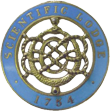About Freemasonry
It was in 1717 that, according to Grand Secretary Nigel Brown, a group of like-minded men got together in a coffee house and devised a non-sectarian, socially egalitarian forum in which men of integrity could fraternise, while avoiding the vexed issues of religion and politics. They took as their guiding metaphor the trade of stonemasonry, hence the symbols of Freemasonry – the square, compass and apron – and its three degrees of evolution, Entered Apprentice, Fellow Craft and Master Mason. Freemasonry acknowledges that here is a longing in men to belong, to bond with other men, to help others (Masons donate £30 million a year to charity) and to take part in ritual.
"We all take part in ritual in some form or another," says Mr Brown. "The ritual in our case is a series of one-act plays. You have to be a thespian to some degree, to learn your lines."
To be a Freemason you have to be male (although women have established their own lodges), aged 21 and a believer in a "supreme being". So you can be a Christian or a Jew or a Muslim but not an atheist. One can apply but for most recruits it is the tap on the shoulder. The one-act plays, to use Mr Brown's description, are staged during initiation and progression to a higher degree. "They are allegorical plays," explains Mr Brown. "You come into life with absolutely nothing, and that is what the initiation is about. The second play is about living a good life and the third is about preparing for the end of your life."
Freemasonry means different things to each of those who join. For some, it’s about making new friends and acquaintances. For others it’s about being able to help deserving causes – making a contribution to family and society. But for most, it is an enjoyable hobby. Freemasonry is one of the world’s oldest and largest non-religious, non-political, fraternal and charitable organisation. It teaches self-knowledge through participation in a progression of ceremonies. Members are expected to be of high moral standing and are encouraged to speak openly about Freemasonry. The following information is intended to explain Freemasonry as it is practised under the United Grand Lodge of England, which administers Lodges of Freemasons in England and Wales and in many places overseas.
Freemasonry is a society of men concerned with moral and spiritual values. Its members are taught its principles (moral lessons and self-knowledge) by a series of ritual dramas - a progression of allegorical two-part plays which are learnt by heart and performed within each Lodge - which follow ancient forms, and use stonemasons’ customs and tools as allegorical guides. Freemasonry instils in its members a moral and ethical approach to life: its values are based on integrity, kindness, honesty and fairness. Members are urged to regard the interests of the family as paramount but, importantly, Freemasonry also teaches and practices concern for people, care for the less fortunate and help for those in need.
More information is available on the United Grand Lodge of England website www.ugle.org.uk
